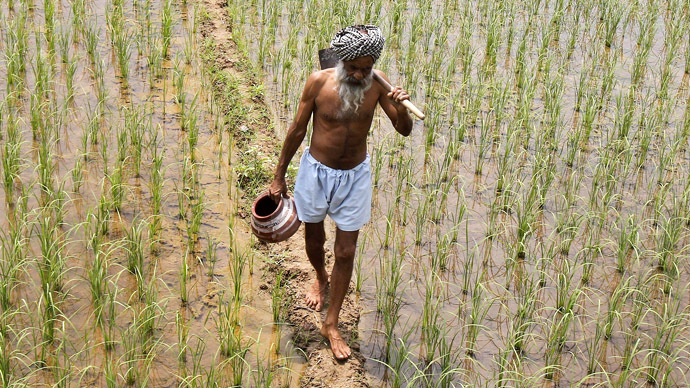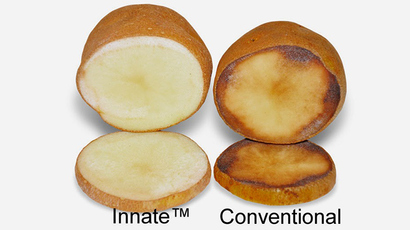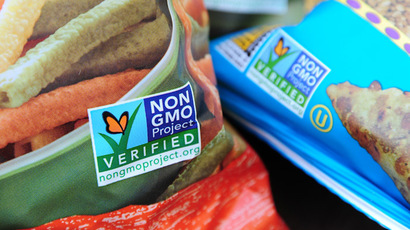Rising suicide rate for Indian farmers blamed on GMO seeds

Monsanto, which has just paid out $2.4 million to US farmers, settling one of many lawsuits it’s been involved in worldwide, is also facing accusations that its seeds are to blame for a spike in suicides by India farmers.
READ MORE: Monsanto to pay $2.4mn to farmers over 2013 GMO-wheat scare
The accusations have not transformed into legal action so far,
but criticism of Monsanto has been mounting, blaming the giant
company for contributing to over 290,000 suicides by Indian
farmers over the last 20 years.
The author of a documentary on Indian farmers’ suicides,
Alakananda Nag, who has interviewed dozens of the relatives of
those who have taken their lives, links the rise in the suicide
rate to the use of GMO seeds. She believes small farms are
particularly vulnerable.
“The large farms certainly have the funds to support
themselves and get on, but the smaller ones are really ones that
suffer the most,” Nag told RT. “Monsanto definitely has
a very big hand to play. A few years ago it was illegal to grow
GMO crops in India. It’s not like the suicide did not exist back
then. It did, but I think there was definitely a sharp rise in
the [suicide] numbers once [GMOs] were allowed.”
The Center for Human Rights and Global Justice has estimated that in 2009 alone 17,638 Indian farmers committed suicide, or one suicide every 30 minutes.
Farmers’ widows, such as Savithri Devi from India’s southern
state of Telangana, explain just how tough things can get for
those trying to grow enough crops to earn a living.
“[My husband] initially put a bore well, then started
cultivation, but we didn’t get enough water from the bore well
and there were no rains, too,” Devi told RT. “So he
again tried to deepen the bore well, but it didn’t work. So he
borrowed money. His depression eventually led him to committing
suicide. He drank pesticide and died.”
The legalization of GMO in 2002 has only added to the stress
experienced by Indian farmers, according to the head of the
Council for Responsible Genetics, Sheldon Krimsky.
“The people would give out the loans if they believed these
seeds would give the greatest yields,” Krimsky told RT.
“So they are not going to get a loan if they don’t go with
the GMOs. And many of them felt coerced to take the GM seeds. The
GM crops have not done as well in all regions of India... [That
has led to] much greater indebtedness with the GM crops that did
not perform as well.”
The problem with GMO seeds in India is that they are often “not
bred for that area, for rain-fed agriculture, so they fail more
frequently,” Dr. Vandana Shiva, an Indian environmental activist
and anti-globalization author, told WeAreChange.com.
She also says the problem is most acute in the regions where
cotton is grown. Small farms there increasingly have to compete
with multinational agribusiness corporations.
Big firms use biotech cotton seeds to gain higher yields, while
smaller ones are trying to do the same.
“Generating high yields with [biotech] cotton seeds also
requires much higher amounts of water than other cotton
cultivars. For farmers who lack access to proper irrigation and
whose farms are primarily rain-fed, the crop often fails,” a
report by Center for Human Rights and Global Justice says.
Monsanto, meanwhile, denies that its seeds have contributed to
the hardships of the Indian farmers.
“Despite claims by those who oppose GMO crops, research also
demonstrates there is no link between Indian farmer suicides and
the planting of GMO cotton,” the company says on its
website, where an article is titled: “Is Bt or GMO Cotton the
Reason for Indian Farmer Suicides?”
The US company cites several studies to support its claim,
including a 2008 report published by the International Food
Policy Research Institute, a Washington-based think tank. The
study argues that there is no evidence for an increased suicide
rate following the 2002 introduction of biotech cotton.
Monsanto, which is the world’s largest producer of genetically
engineered seed, has been involved in high-profile lawsuits
globally over its products.
A number of human rights advocates have warned that GMOs have not
been studied thoroughly enough to evaluate their potential risks.
Fears over GMOs possible impact have given rise to a worldwide
March against Monsanto movement. Their annual protests against the spread of GMO have seen
hundreds of thousands of people on all continents participating.














